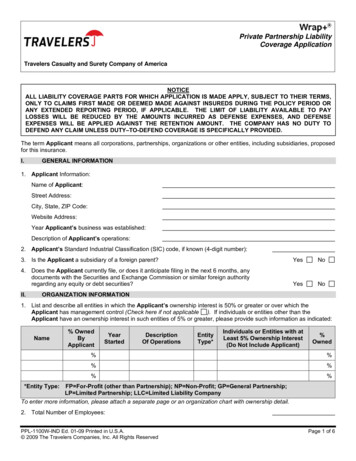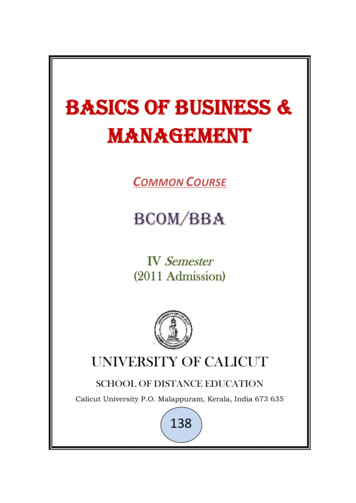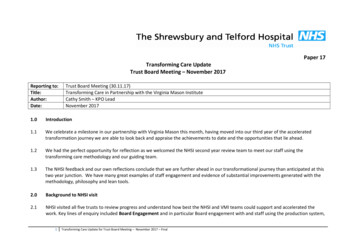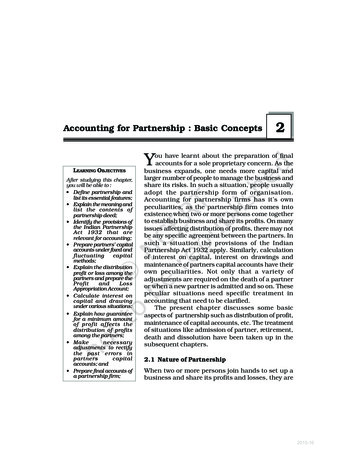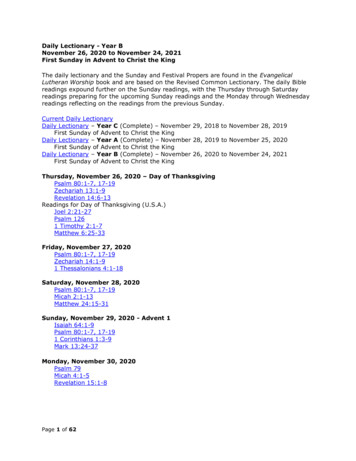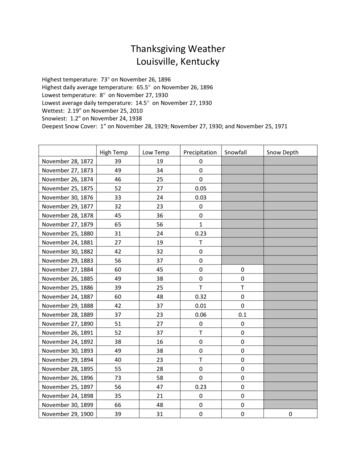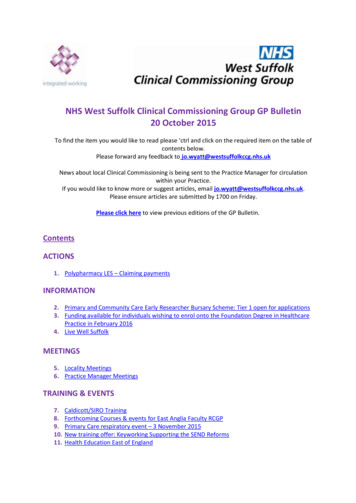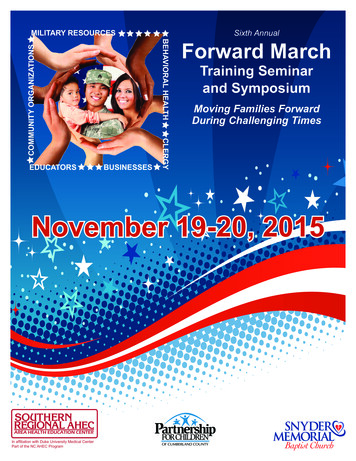
Transcription
Sixth AnnualMILITARY RESOURCESBUSINESSESTraining Seminarand SymposiumMoving Families ForwardDuring Challenging TimesCLERGYCOMMUNITY ORGANIZATIONSBEHAVIORAL HEALTHEDUCATORSForward MarchNovember 19-20, 2015In affiliation with Duke University Medical CenterPart of the NC AHEC Program
program informationNovember 19-20, 20158 a.m. - 4:30 p.m. both daysLocationSnyder Memorial Baptist Church701 Westmont Drive Fayetteville, NC 28305FeeStudent (w/ current ID): 64 when registration andpayment are received before November 7; 74.50 thereafter.Individual: 129 when registration and payment arereceived before November 7; 149 thereafter.DescriptionWe would like to welcome you to the Forward MarchTraining Seminar and Symposium. Over the past five years,the Forward March Training Seminar and Symposium hasbeen instrumental in increasing public awareness of theunique challenges experienced by military families,especially in times of various changes and multipleconflicts.The Training Seminar and Symposium has been amodel of collaboration between local, state, and nationalorganizations. The forum promotes and fosters outcomesby building effective lines of communication throughcollaboration between military and civilian professionalswho serve military members and their families. There aremany challenges that military members and their familiesface on a daily basis. Identifying the tools and resources inthe community is necessary to effectively address theirneeds. This Training Seminar and Symposium continuesto be a major catalyst for providing military and civilianresources in working with military families.We must not forget our service men and women as well astheir families. These individuals continue to make sacrificesfor our great nation. As Americans, we need to rememberthat military families may continue to face adversity aftertransitioning out of their service roles. We will continueto promote resiliency by providing support to servicemembers and their families.For more information about Forward March please contact:La-Lisa Hewett-Robinson, MA, Southern Regional AHEC(910) 678-7293 or la-lisa.hewett-robinson@sr-ahec.orgFor additional information about Forward March or ourmilitary initiatives committee, Living in the New Normal,please contact: John Freudenberg, MBA, Government &Military Affairs Liaison with the Partnership for Children(910) 826-3122 or Jfreudenberg@ccpfc.org.Target AudienceThis Training Seminar and Symposium will be beneficialto substance abuse professionals, psychologists, socialworkers, case managers, counselors, school personnel,clergy, military personnel, groups working in or aroundmilitary communities, veteran services, government, schoolsystems, faith-based and community resources, non-profit,and private organizations. Other interested mental healthor human service professionals are welcome to attend.Credits/RefundsCEU: 1.2Contact Hours: 12.0Credit will be awarded to participants who attend 100% ofthe program. SR-AHEC adheres to NAADAC EducationGuidelines Provider #843 (Substance Abuse Credit). Theprogram will provide 12.0 contact hours (category A)continuing education credit to NC Psychologists. Thisprogram does not provide specific NBCC Credits.However, per LPC licensure guidelines, you may submit upto 15.0 contact hours of continuing education per renewalperiod, by attending programs by affiliates of the NationalArea Health Education Center Education (NAO). NBCCcredit will not be offered at this Training Seminar andSymposium.As part of the NC AHEC system, SR-AHEC is anNCBPTE approved provider of continuing competencewith regards to activities directly related to physical therapy.The program will award 12.0 contact hours for NCBPTE.No partial credit will be given. Individuals arriving 15minutes or more after the program has started will notreceive credit.Participants who register for the program and are not ableto attend, may: Send a substitute; Cancel 48 business hours before the program and receivea voucher for 100% of the registration fee for use at afuture SR-AHEC program; or Cancel 48 business hours before the program and obtain arefund for 70% of the registration fee.Cancellations less than 48 business hours before theprogram are non-refundable. Participants who register fora program and do not attend will forfeit the full amount ofthe program registration fee.
exhibitorsArmy Community ServiceJunior League of FayettevilleThe Barry Robinson CenterNational Association of Social Workers - NorthCarolina Chapterwww.fortbraggmwr.com/acsSoldier Support Center4-2843 Normandy Dr, Fort Bragg, NCwww.barryrobinson.org443 Kempsville RdNorfolk, VA 23502Brynn Marrhttp://www.brynnmarr.org(910) 577-1400192 Village DrJacksonville, NC 28546Cape Fear Valley Health Systemswww.capefearvalley.com1638 Owen DriveFayetteville, NC 28304Fayetteville VA Medical Centerwww.fayettevillenc.va.gov2300 Ramsey StreetFayetteville, NC 28301Fayetteville Vet Centerwww.va.gov/directory/guide/facility.asp?ID 4864140 Ramsey St. Suite 110Fayetteville, NC 28311Holly Hillhttp://hollyhillhospital.com(919) 250-70003019 Falstaff RdRaleigh, NC 27610Hope-Thru-Horses, Inc.www.hope-thru-horses.com162 Schmidt LaneLumber Bridge, NC 28357Institute for Veterans and Military Familiesvets.syr.edu(315) 443-5437IVMF at Barclay, 150 Crouse DrSyracuse, New York 13244https://www.jlfay.org2605 Fort Bragg RoadFayetteville, NC 28303http://www.naswnc.orgNational Military Family Associationwww.militaryfamily.org3601 Eisenhower Avenue, Suite 425Alexandria, VA 22304Old Vineyard Behavioral Health Serviceshttp://oldvineyardbhs.com3637 Old Vineyard RoadWinston-Salem, NC 27104Partnership for Children Cumberland Countyhttps://ccpfc.org351 Wagoner DriveFayetteville, NC 28303Relay NC - Dial 711http://www.relaync.com/(919) 518-91744030 Wake Forest Rd., Suite 300Raleigh, NC 27609Southern Regional AHECwww.sr-ahec.org(910) 323-11521601 Owen DriveFayetteville, NC 28304Strategic Behavioral Center: PsychiatricBehavioral Hospitalhttp://www.sbcraleigh.com(919) 800-44003200 Waterfield DrGarner, NC 27529
program informationHotel AccommodationsWingate by Wyndham4182 Sycamore Dairy RoadFayetteville, NC 28303Tel: (910) 826-9200Fax: (910) 826-9202Email: wingatebywyndham1388@gmail.comA block of rooms have been reserved at a discount rate of 93 per night. The hotel offers several amenities for guestssuch as: 24-hour fitness facility, complimentary wirelessinternet access and continental breakfast.Please contact the reservation desk at (910) 826-9200 oronline at: http://wingatehotels.com/hotel/01388and use the corporate code “Forward March”.ContactFor information regarding program registration, please call(910) 678-7226. For questions regarding educational contentor professional credit, please contact:La-Lisa Hewett-Robinson, M.A.Administrator, Mental Health Continuing EducationSouthern Regional AHECTel: (910) 678-7293Email: la-lisa.hewett-robinson@sr-ahec.orgMelanie WheelerTel: (910) 678-7209Email: melanie.wheeler@sr-ahec.orgFor continuing education references concerning inclementweather, tobacco-free campus, and ADA requirements,please go to: http://sr-ahec.org/ContinuingEd/CE.htmlfeatured speakerDr. Kelly Posner is the founder and principal investigator of the Center for Suicide Risk Assessmentat Columbia University, and a member of the board of the American Foundation for SuicidePrevention. She was commissioned by the FDA to lead a study to develop improved methods ofsuicide risk assessment which have been recommended or mandated across many areas of medicineThe New York Times called this work, “one of the most profound changes of the past 16 years toregulations governing drug development,” and the FDA has characterized this work on suicideprevention as, “setting a standard in the field.” This work is part of a national and international publichealth initiative across health care, surveillance, and research. Of note, numerous states, countries,and branches of the military have moved towards system-wide implementation. Named one of New York Magazine’s“Most Influential” people, Dr. Posner continues to work with the FDA, CDC, NIMH, military health care agencies,the U.S. Department of Education and other agencies on suicide assessment and surveillance. In 2007, Dr. Posner wasrecognized as the most distinguished alumna of her graduate school at Yeshiva University in the past 50 years and inJune 2008 she gave the invited presentation on tackling depression and suicide at the first European Union high levelconference on mental health. She received the New York State Suicide Prevention Award in 2013.Dr. Kelly Posner has been a long-standing advocate of education reform. She is the founding chairman of theBoard of Turnaround for Children, the groundbreaking model that is the first to fix failing schools in high-povertycommunities, often referred to as “a missing link” of the education reform challenge. She is also founder of the firstindependent school and institute for advanced learners and for her work in her innovative educational initiatives;she was named Education Philanthropist of the Year. In 2011, she was also granted The Turnaround Impact Award.Dr. Posner was recently honored by The Lincoln Center/The Kaufman Music Center with their annual EducationalLeadership Award.The President of the American Psychiatric Association has stated that because of her work, “we may actually be able tomake a dent in the rates of suicide that have existed in our population and have remained constant over time thatwould be an enormous achievement in terms of public health care and preventing loss of life.” - Jeffrey Lieberman, M.D.,President of American Psychiatric Association (APA)
program agendaThursday, November 19, 20158 a.m.Welcome and Housekeeping (To include recognition of dignitaries)Dr. Deborah Teasley, president and CEO, Southern Regional AHECJohn Bigger, M.S., LPC, administrative director, Clinical Services & Sleep Center, Cape Fear ValleyPresentation of ColorsE. E. Smith High SchoolNational AnthemDanita McDuffie, Terry Sanford High School8:05 a.m.Welcome to Snyder Memorial Baptist ChurchRev. John Cook, M.Div., MS, Pastor8:10 a.m.Fort Bragg Community WelcomeCOL Brett Funck, Fort Bragg Garrison Commander8:20 a.m.Introduction of Opening PlenaryOpening Plenary - Beyond the ABCs of Child and Adolescent Behavioral HealthCOL (Dr.) Marla Hemphill, child and adolescent psychiatrist, Behavioral Health, Womack Army Medical CenterDr. John Lesica, child and adolescent psychiatrist, Behavioral Health, Womack Army Medical CenterObjectives: Discuss the common child and adolescent behavioral health disorders that are affecting military families; and Identify strategies to support building resiliency.9:20 a.m.Defining Moments: Video presentation of “What It’s Like to Be a Military Kid”9:25 a.m.Break9:35 a.m.Breakout SessionsA) R2T - Responses to Trauma: An Experiential WorkshopDr. Elizabeth Snyder, Applied Culture Group, LLCObjectives: Identify types of trauma and responses to trauma; Examine impacts of trauma on individuals, families and communities; Explore links between unhealed trauma and personal/collective harm; and Introduce holistic modalities for trauma healing and resilience.B) Transitions: Military Families on the MoveDr. Mark Marquez & Dr. Greg Perkins, Fayetteville State UniversityObjectives: Discuss relocations, reintegration after deployment and other separations that impact families; and Describe special needs such as behavioral health, addressing care and resources.Thank you to our Presenting Sponsorwww.barryrobinson.org443 Kempsville Road Norfolk, VA 23502Behavioral Health Programs at the Barry Robinson Center are designed to providehighly structured, nuturing, success-oriented treatment programs for children andadolescents who are experiencing emotional and behavioral difficulties. They are theleading center for substance abuse specifically tailored to children and young adults.Our St. Brendan’s Harbor program supports their unique health and emotional needsin a safe and caring environment.
program agendaC) Understanding the Claims Process and VHA Healthcare Services for Women VeteransShenekia Williams-Johnson, RN, BSN, MAOM, VISN 6 Lead, Women Veterans Program Manager, Department ofVeterans AffairsAlohalani Pickett, BS, MPA, Women Veteran Outreach Coordinator, Department of Veterans Affairs BenefitsAdministrationObjectives: Explain the Compensation and Benefits process, particularly as it relates to PTSD and Military SexualTrauma; and Discuss specific health care benefits and services available to female Veterans at VA Medical Centers andCommunity Based Outpatient Clinics.D) Supporting Military Children with Special NeedsDana Garner, Penn State ABAObjectives: Discuss an overview of developmental disabilities in children; and Identify resources to assist in supporting military children with special needs.E) Long-term Consequences of Combat StressLT COL Jim Johnson, Ret.Diana Rahe-TaylorObjectives: Discuss the long-term effects of combat stress from a personal and clinical perspective; and Identify strengths and challenges in working with veterans affected by combat stress.11:05 a.m. Networking Break, Visit Exhibitors and Lunch (provided)11:50 a.m. Lunch Plenary - A Strengths-based Approach for Supporting Women VeteransMea Williams, MBA, executive director, Grace After FireObjective: Describe the strengths of women veterans and ways in which to help them thrive.1 p.m.Break1:15 p.m. Breakout SessionsA) Supporting Women VeteransMea Williams, MBA, executive director, Grace After FireObjectives: Discuss and overview of Grace After Fire, the evolving role of women in the military and their strengthsand challenges; and Identify methods that organizations, professionals and communities can use to support women veterans.Thank you to our Presenting 4 Roxie Ave Fayetteville, NC 28304Cape Fear Valley Behavioral Health Care offers inpatient mental health services foradults and outpatient services for children ages four and older, adolescents and adults.Behavioral Health Care offers psychiatric treatment, including evaluations, medicalmanagement, and group, family and individual therapy. Substance abuse treatment isalso available.
program agendaB) The Nature, Cause and Treatment of Unresolved Traumatic Brain InjuryDr. Wesley Cole, Defense and Veterans Brain Injury Center at Fort BraggObjectives: Describe the types of persistent issues commonly experienced after TBI; Discuss the causes of persistent problems after TBI; and Describe the biopsychosocial approach to understanding and treating persistent TBI symptoms.C) Journey through Grief and Trauma: A Gold Star Family’s DialogueDr. Mark Marquez & Daniele Malvesti, B.S.Objectives: Describe the impact of living with the loss of a military family member; and Discuss family, holistic and community supports for bereaved family members.D) Combat Trauma: A Spousal ResponseLT COL (Dr.) James Johnson, (Ret.)Diana Rahe-TaylorObjective: Discuss the long-term effects of combat stress from a spouse/family perspective; and Identify supports and resources for family members.E) Empathy FatigueJames Gierke, director of victim services, National Organization on Victim AssistanceObjectives: Identify signs and symptoms of empathy fatigue; and Discuss three methods to practice self-compassion.2:45 p.m. Break3 p.m.Introduction of Closing PlenaryRon Buryk, Womack Army Medical CenterClosing Plenary - Ready to Serve: Community-based Provider Capacity to Deliver CulturallyCompetent, Quality Mental Health Care to Veterans and their FamiliesTerri Tanielian, senior social research analyst, RAND CorporationObjectives: Discuss the workforce addressing veterans’ mental health needs; and Describe the capacity of the civilian health care sector to deliver culturally competent, quality services toveterans and their families.4:30 p.m. Closing Remarks/Adjourn Day 1Thank you to our Presenting arr.orghttp://hollyhillhospital.com
program agendaFriday, November 20, 20158 a.m.Welcome & HousekeepingEva Hansen, Partnership for Children of Cumberland County, Inc.8:05 a.m.8:15 a.m.Opening Plenary - Overview Veterans Career Transition ProgramLaura Cooper, program manager, Veterans Career Transition Program, Institute for Veterans/Military Families, SyracuseUniversityObjective: Describe an interdisciplinary national institute in higher education focused on the social, economic, educationand policy issues impacting veterans and their families post-service.9:15 a.m.Defining Moments: Video presentation of “What It’s Like to Be a Military Kid”9:20 a.m.Break9:30 a.m.Breakout SessionsA) The “Reaching Teens” Model: A Community Collaborative Approach to Building ResiliencyVirginia Hoft, executive director, Santa Fe Youth ServicesVicki Warren, director, Intervention Services, Fort Worth Independent School DistrictObjectives: Discuss an overview of how to implement the “Reaching Teens” model; and Describe a broad-based community collaboration in building competencies in working with youth.B) Hidden Heroes: America’s Military CaregiversTerri Tanielian, senior social research analyst, RAND CorporationObjectives: Describe the role and effects of caregiving on military family caregivers; and Discuss the unique challenges and strengths of military caregivers.C) Military Sexual Assault: The Impact of FamiliesCPT Jesse Sommer, Brigade Trial Counsel, JAGMike Kontio, CMD program manager and sexual assault response coordinator (SARC), Joint Special Operations CommandKelly Taylor, RN, sexual assault nurse examiner, Womack Army Medical CenterJames Boerner, special agent, CIDObjectives: Describe the sexual assault reporting process; and Discuss the roles of the sexual assault medical forensic examiner, victim advocate, CID special victim unit,special victim counsel and Army prosecutor.Thank you to our SponsorsGoldsilver
program agendaD) Strength through Support: Cumberland and Harnett Counties Veterans Treatment CourtsJudge Lou Olivera, 12th District Veterans Treatment CourtCraig Shore, program coordinator, Cumberland County Veterans Treatment CourtMark Teachey, Harnett County Veterans Treatment CourtJenae Hebb, LCSW, LCAS-A, substance abuse team leader, Carolina OutreachObjectives: Discuss an overview of veterans treatment court justice system; and Describe ways in which veterans receive support through the veterans’ treatment court justice system.E) Are we Ready for Some TRICARE Reform?Joyce Raezer, M.A., executive director of the National Military Family AssociationObjectives: Identify current issues affecting military families’ TRICARE benefits; Describe how changes in health care at national level under Affordable Care Act and private sectorinnovations in health care might affect care offered to military families and transitioning veteran families; and Discuss health care access and quality challenges experienced by military families.11 a.m.Networking Break, Visit Exhibitors and Lunch (provided)11:45 a.m. Lunch Plenary - Columbia Suicide Risk Severity ScaleDr. Kelly Posner, director, Center for Suicide Risk Assessment, Columbia UniversityObjective: Discuss how to identify and prove methods of suicide risk identification.1:15 p.m. Defining Moments: Video presentation of “What It’s Like to Be a Military Kid”1:20 p.m. Break1:30 p.m. Breakout SessionsA) Traumatic Brain Injury and Polytrauma Program OverviewTenia Morrison, RN, support group coordinator, Fayetteville VA Medical CenterKatherine Mitchell, LCSW, Fayetteville VA Medical CenterObjectives: Discuss the TBI and polytrauma program; and Identify community resources and supports for veterans.B) Getting through the Maze: Unique Challenges of Military Members and their FamiliesJerry Powell, D.Min., LPC, LMFT, NCC, mental health counselor, Banner ConsultingObjectives: Discuss the unique issues directly related to military families that are not present in non-military families;Thank you to our bronze SponsorsFayetteville VAMedical Center
program agenda Describe how the presenter’s concept of the “Three Prime Directives” in combat contribute to emotionaldisconnection and relationship difficulties in family dynamics and how that disconnection ripples into thecommunity; and Discuss the differences between post-traumatic stress in the family and mild traumatic brain injury and howthey vary from post-combat reintegration.C) Establishing Trauma-Informed Schools in a Military CommunityNichole Johnson, MSW, LCSW, LCAS, LISW-CP, military social worker, Fort BraggTanisha R. James, LCSW, Fayetteville NASWObjectives: Discuss the impact of trauma; Describe the term “trauma-informed;” and Discuss and explain methods to incorporate trauma-sensitive approaches.D) An Overview of Cognitive Behavioral Couples Therapy (CBCT) for DepressionDr. Sara Boeding, Durham VA Medical CenterObjectives: Describe the framework and principles of CBCT for depression; and Identify methods to increase knowledge and skills in couples domain.E) Moral Injury: Supporting and Ministering to our Service Members and VeteransLynn Newsom, MA, Quaker House Military Counseling CenterJoanna Nunez, MSW, LCAS, LCSW, Square One Counseling PLLCObjectives: Discuss the history and definitions of the term “moral injury;” Describe how differentiate between the symptoms of PTSD and moral injury; Identify treatments and techniques for helping those who suffer from moral injury; and Discuss resources and information about moral injury.3 p.m.Break3:10 p.m. Closing Plenary - Wounded Marine WarriorSGT Carlos Evans (Ret.), U.S. Marine CorpsObjectives: Describe the strengths and challenges of being a wounded warrior; and Identify resources and approaches for working with wounded warriors.4:25 p.m. Closing RemarksThank you to our Friends of forward march sponsors
planning committeeRonald BurykDaniele MalvestiMary Ann ClevelandMark MarquezKristy CurranShawn McElroyBarry DuganMaureen McNeillWhitney FelklGreg PerkinsWomack Army Medical CenterUnited States Army Special Operations CommandCumberland County SchoolsXVIII Airborne CorpsU.S. Army Special Operations CommandNorma FraserFayetteville VAMCJohn FreudenbergPartnership For Children of Cumberland County, Inc.Ann HamiltonNational Military Family AssociationEva HansenPartnership For Children of Cumberland County, Inc.Monica HaynesPartnership For Children of Cumberland County, Inc.Kim HetheringtonXVIIIth Corps Fort BraggNathania HeadleyAlliance Behavioral HealthcareLa-Lisa Hewett-RobinsonSouthern Regional AHECCathy HurleyCumberland County SchoolsPartnership For Children of Cumberland County, Inc.Dept. of Social Work, Fayetteville State UniversityBarry Robinson CenterCommunity VolunteerDept. of Social Work, Fayetteville State UniversityAlliance Behavioral Health CareAmy QuinnCommunity VolunteerAdrian ReederUnited States Army Special Operations CommandAlejandra RobinsonCommunity VolunteerMarla SchroederFORSCOMJean SquierHoke County Partnership for ChildrenHeather WilkersonHope-Thru-Horse, Inc.Meg WilkinsCommunity Volunteer, Moore County NCShadia YoungXVIIIth Corps Fort Bragg
speaker biographiesGeneral Robert B. “Abe” Abrams, became the22nd commander of U.S. Army Forces Command,August 10, 2015. He is a 1982 graduate of theUnited States Military Academy where he wascommissioned as an armor officer. General Abramsholds a bachelor of science degree from the UnitedStates Military Academy; a master of science in administrationfrom Central Michigan University; and a master’s degree instrategic studies from the United States Army War College. Hismilitary schooling includes the Armor Basic and AdvancedCourses, the Combined Arms and Services Staff School, theU.S. Army Command and General Staff College, and the U. S.Army War College. During his 33 years of service he has servedin command and staff positions across the Army, Joint andDepartment of Defense community in Germany, the UnitedStates, and Southwest Asia. General, U.S. Army Europe and 7thArmy.His other general officer assignments include service as DeputyCommanding General, Combined Arms Center-Training, FortLeavenworth, Kansas, and most recently as Senior MilitaryAssistant to the Secretary of Defense.His tours of duty with warfighting units include 3rd ArmoredDivision; 1st Cavalry Division (three tours); the 3rd InfantryDivision; and 3rd Armored Cavalry Regiment. His jointexperience includes serving as a strategic war planner forthe Chairman, Joint Chiefs of Staff, with responsibility forCENTCOM Area of Operations; and as Director of the JointCenter of Excellence for Improvised Explosive Device Defeat/Deputy Director for Training for Joint IED Defeat Organization(JIEDDO).General Abrams has commanded at every level from companythrough division, including command of D Company andHeadquarters and Headquarters Company, 1st Battalion, 8thCavalry Regiment where he deployed the HHC in supportof Operations DESERT SHIELD and DESERT STORM;Commander, 1st Battalion, 8th Cavalry Regiment; Commander,1st Brigade Combat Team, 1st Cavalry Division where hedeployed the BCT to Sadr City and nine Nissan Districts ofBaghdad, Iraq in support of Operation IRAQI FREEDOMII; Commanding General, National Training Center and FortIrwin; Commanding General, 3rd Infantry Division and FortStewart/Hunter Army Airfield where he deployed the divisionheadquarters and commanded Combined Joint Task Force-3and Regional Command-South, International Security AssistanceForce (ISAF), Kandahar, Afghanistan. He has extensiveoperations experience having served as an operations officer atsquadron, regimental and division level and as a division chief ofstaff. General Abrams has also served as an instructor, doctrinewriter, and training developer at the U.S. Army Armor School,and as the Executive Officer to the Commanding General, U.S.Army Europe and 7th Army.John Bigger, M.S., LPC, received his undergraduatedegree in psychology from the University of Alabamaand his Master’s in Clinical Psychology in 1985. Hehas worked in a variety of clinical settings rangingfrom an outpatient state mental health programto a private in-patient treatment center. John’s specialty areasinclude the treatment of chemical dependency, identificationand treatment of eating disorders, and crises intervention. Heis also a Licensed Professional Counselor. John is currently theadministrative director, Clinical Services & Sleep Center, CapeFear Valley.Sara Boeding, Ph.D., is a clinical psychologistworking in the Operation Enduring Freedom/Operation Iraqi Freedom (OEF/OIF) Clinic atthe Durham, NC, Veteran’s Affairs MedicalCenter. There she provides empirically-supportedindividual, group and couple-based treatments for commonpost-deployment concerns such as PTSD, depression, andanxiety disorders. She has treated couples using CognitiveBehavioural Couples Therapy (CBCT) for eight years, includingtreating relationally distressed couples, enhancing relationshipsatisfaction for couples preparing for marriage, and assistingcouples in which one individual has a mental health concern (e.g.,depression, OCD, PTSD).Wesley R. Cole, Ph.D., received a bachelor’s degreein psychology from James Madison University. Heearned a master’s degree and doctorate in clinicalpsychology from the University of South Carolina.After moving to Baltimore, Cole completedpredoctoral internships and postdoctoral fellowships in pediatricpsychology and neuropsychology at the Kennedy KriegerInstitute, an affiliate of the JohnsHopkins School of Medicine. He worked for a year at theKennedy Krieger Institute’s Department of Neuropsychology. In2008, he accepted a job at the Womack Army Medical Center’sConcussion Care Clinic. Looking to expand his roles intoresearch activities, he joined the DVBIC at Fort Bragg in 2009.Laura Cooper, is responsible for the management,coordination and administration of the IVMF’sVeterans Career Transition Program (VCTP). Joiningthe VCTP team in 2012, she served as an AcademicAdvisor for two years prior to beginning her role asProgram Manager in 2014. She has previous experience withinthe education industry, including a four-year role as an academicadvisor and later advisor team lead for an online nursingprogram. She holds a bachelor’s degree in English and education,and a minor in Spanish language, from Wingate University,North Carolina. Her passion is connecting learners withcontinuing education opportunities and aiding in personal andprofessional growth through advanced degrees, certificates,formal training or any means of learning.SGT Carlos Evans (Ret.) was born in Puerto Rico,and was an avid athlete through his high school andcollege years. When the tragic eventsof September 11, 2001 occurred, he felt compelled
speaker biographiesto join the family legacy of service in the U.S. Marine Corps.Evans served three tours of duty in Iraq and was assigned toAfghanistan for his fourth deployment. In May 2010, he was thesquad leader on foot patrol when he stepped on an improvisedexplosive device. The blast took both of Evans’ legs and hisleft hand. He underwent several skin graft surgeries and laterrecieved a prosthetic hand and legs from Walter Reed MilitaryMedical Center.COL Brett Funck, M.S., has earned a Bachelor’s ofScience Degree, a Master’s Degree and is a graduateof the National Security Program of Canada. COLFunck grew up in New York and was commissionedinto the Infantry in 1994 upon graduating from theUnited States Military Academy at West Point. In his career,COL Funck has been stationed at Fort Carson, CO, Baumholder,Germany, Darmstadt, Germany, and Hawaii. Following theCommand and General Staff College at Fort Leavenworth,Kansas, COL Funck served as the Operations Officer andlater as the Executive Officer of 1st Battalion, 508th ParachuteInfantry Regiment, within 4th Brigade, 82nd Airborne Division.Upon completin
Winston-Salem, NC 27104 Partnership for Children Cumberland County https://ccpfc.org . She received the New York State Suicide Prevention Award in 2013. Dr. Kelly Posner has been a long-standing advocate of education reform. She is the founding chairman of the . RN, BSN, MAOM, .
